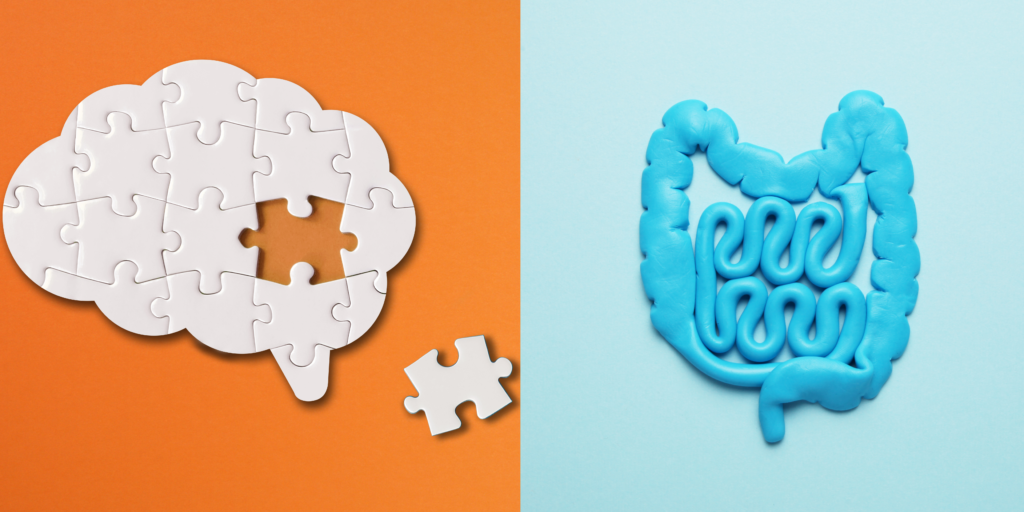Gut Health:
How Menopause Affects Your Digestion
Gut health plays a crucial role in overall well-being, and it can be particularly relevant during menopause due to the hormonal changes that occur. Here’s how gut health can be influenced during menopause and what you can do to support it:

What is your Gut Microbiome?
Before we jump into the strategies to optimize your gut health, lets take a moment to understand what it is. The term gut microbiome refers to the millions of microorganisms living in your intestines. These include a variety of bacteria, viruses and fungi. Some of these microorganisms can be harmful, but many are also great at keeping our gut healthy and reducing the risk of inflammatory bowel disease and diabetes.
The Gut Brain Connection
A hot topic in the nutrition world is the research around the gut-brain connection. New research shows that an unhealthy gut can affect your brain, productivity and emotions. The theory is that your gut contains 500 million neurons which are connected to the 100 billion neurons in your brain. These neurons communicate, linking emotional and cognitive parts of the brain with our intestinal function.
The science is still relatively new, but research is promising, and there is mounting evidence that our gut microbiome has a direct and important role in the nervous system in our brain.

What does Menopause have to do with my Gut?
Menopause can affect your gut microbiome in a variety of ways:
- Hormonal changes: During menopause, the decline in oestrogen levels can impact the gut microbiome. Oestrogen helps to maintain the balance of gut bacteria, and when our levels drop, it can lead to changes in the composition and diversity of the microbiota.
- 2. Digestive symptoms: Many women in midlife experience digestive symptoms such as bloating, gas, constipation, or diarrhoea. These symptoms can be related to hormonal fluctuations, changes in metabolism, and alterations in gut motility. Maintaining a healthy gut can help alleviate these symptoms.
- 3. Weight management: Menopause often brings changes in body weight distribution. Studies suggest that the gut microbiota may influence our metabolism and therefore our weight management too.
- Nutrient absorption: A healthy gut is essential for proper nutrient absorption. Hormonal changes during menopause can affect the gut lining, potentially impacting nutrient absorption.

8 Strategies for a Healthy Gut
To support gut health during menopause, consider the following strategies:
– Consume a diverse range of fiber-rich foods: Include a variety of fruits, vegetables, whole grains, legumes, and nuts in your diet. These foods provide prebiotic fibers that nourish the beneficial gut bacteria. Check out these healthy high fibre snack ideas!
– Incorporate fermented foods: Foods like yogurt, kefir, sauerkraut, kimchi, and kombucha contain probiotics—live bacteria that can feed, replenish and diversify the gut microbiota.
– Stay hydrated: Drink an adequate amount of water daily to support proper digestion and reduce the risk of constipation, while keeping the gastrointestinal system functioning optimally.
– Limit processed and sugary foods: Highly processed foods and too much sugar in your diet can negatively impact your gut health. Aim to reduce your intake of processed foods such as fast-food takeout, pastries, microwaveable meals, and sweets, and opt for whole, unprocessed foods whenever possible.

– Manage stress: Chronic stress can disrupt the balance of the gut microbiota. Engage in stress-reducing activities such as exercise, meditation, deep breathing, yoga or engaging in hobbies you enjoy.
– Consider probiotic supplements: Probiotic supplements can also help support gut health by providing a concentrated source of beneficial bacteria. Consult with a healthcare professional to see if probiotic supplementation is right for you.
– Prioritize regular physical activity: Exercise has been shown to positively influence gut health. Aim for regular physical activity that you enjoy to support digestive health and overall well-being.
– Prioritize sleep: Aim for adequate and quality sleep. Sleep deprivation and disturbances can negatively impact gut health and overall hormonal balance – so get some shut eye!